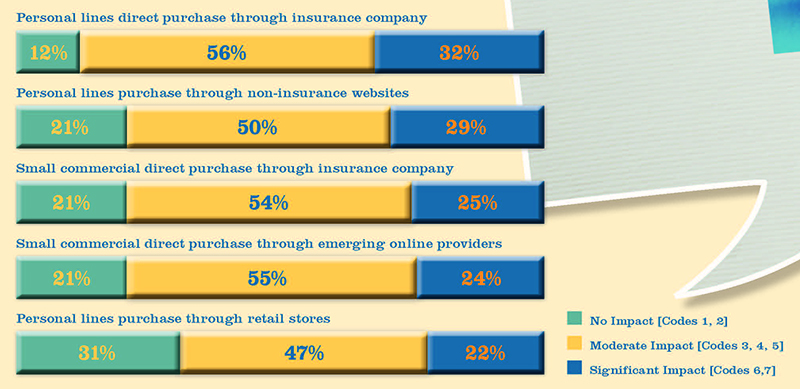Forecast 2020: Which Threats Matter?
By: Jacquelyn Connelly

When the 2018 Future One Agency Universe Study asked agents to anticipate the impact of various emerging purchase channels over the next two years, this is how they responded.
Industry experts agree that personal lines purchase through retail stores simply hasn’t gained traction in the U.S.
“Maybe it would work with a nonstandard brand, with people who are more budget-conscious—something like that,” says Ellen Carney, principal analyst, digital business strategy at Forrester Research, Inc. “But who’s going to be there to answer questions about car insurance coverage at Walmart? You don’t see the big auto insurance carriers saying, ‘Hey, I’m going to set up an office in a Kroger!’”
Besides, as Carney points out, “when you’re sitting there with a cart full of ice cream and frozen food, do you really want to sit there and talk about car insurance?”
Jay Sarzen, senior analyst on the insurance team at Aite Group, a financial research and advisory firm, interprets the top line item as “either a grudging acknowledgment that GEICO and Progressive are going to continue their march toward domination, or an understanding that personal lines is not always a coverage where you really need the help of an insurance agent.”
In fact, 32% strikes Sarzen as “a little bit high” for the proportion of agents who anticipate a significant impact: “Hasn’t the direct channel already impacted your business?”
But beyond personal lines, “I think in the small commercial space, more carriers are looking to do more and more direct,” predicts Carney, who points to AXA in the United Kingdom as an excellent example of a carrier leveraging technology to reach small commercial buyers directly.
The company’s online “business wizard” asks detailed, targeted questions: Is your business asset-intensive? Service-intensive? Do you have employees? How many? What’s your average payroll? How much revenue are you making? How long have you been in business?
“They’re capturing enough information where they make a good recommendation on the type of policy that business owner needs,” Carney says. “It’s a really nice experience. But I haven’t seen anybody in the States do anything like that.”
Although a handful of U.S. carriers are pursuing direct small commercial sales, “they’re not beating their chests about it,” Sarzen agrees. In other words, it doesn’t seem to be a top priority—at least for the time being.
“And I think it’s the same case for online providers of commercial insurance over the next two years,” Sarzen adds. “I’ve had numerous conversations with CEOs for online agencies, and they all say the same thing—when they wake up and their feet hit the floor, they start thinking about, ‘How can I take market share from insurance agencies and have people buy small commercial insurance from me?’ And even they admit, ‘We’re not going to displace them anytime soon.’”
Why not? “The salvation for the agents is there are certain types of small businesses that don’t have time to sit down behind a computer and sort through all their options,” Carney says. “They want to be able to pick up the phone and call their agent and say, ‘Hey, take care of this certificate of insurance for me and send it off to ABC Company, because I got a gig there.’”
Although certain segments of small business buyers will und‑oubtedly find digital purchase options appealing, agents that specialize in a particular niche have little to worry about in the imminent future.
“The degree of specialization for agencies and the word of mouth that generates is amazing,” Carney says. “They know who will write the business—they’ve developed those relationships with carriers. If you’re a small business owner trying to find coverage online, that’s a pain in the neck, because how do you even know if they write coverage for general contractors or IT consultants or whatever it is?”
But that won’t be the case forever, especially as more InsurTechs turn their focus to the small commercial market. Consider Embroker, a tech-driven insurance brokerage for businesses that promises to bring “enterprise-level capabilities and a modern insurance experience to mid-market and growing small businesses.”
Even CoverHound, which you may think of as a simple comparison website, is now branding itself as an “online insurance agency that shops with several leading insurance providers to provide you with instant, accurate quotes.” Commercial offerings range from general liability and business owners policies to professional liability, workers comp and cyber. Sound familiar?
“Commercial lines agents think they’re safer, and if you’re selling mid-market accounts or large accounts, I totally agree with that,” says Mark Breading, partner at Strategy Meets Action. “But there’s a whole bunch of stuff happening for small commercial in the InsurTech world. There’s a threat there for sure.”
Obviously, the same goes for personal lines purchase through non-insurance websites. “You could absolutely imagine that the smart carriers are going to start to expand their distribution partnerships,” Carney says.
But that’s not necessarily a death sentence for agents. “There’s nothing to stop Lemonade from selling through agents,” Carney adds. “I’m surprised some smart agent hasn’t said, ‘I’d love to include you and pitch you to my customers.’ Why not? Agencies don’t have to write for just The Hartford and Travelers and Selective. Why wouldn’t Hippo and Metromile want to expand their distribution channels?”
It would be a smart play for InsurTechs like Lemonade, whose financials aren’t stellar heading into 2019. “Here’s the difference between an agent and an InsurTech: All these InsurTechs are micro monolines,” Carney points out. “If you have a simple need, renters insurance, car insurance, both, that makes sense. But if you’re a family and you’ve got two kids, a house, a second home, a boat, several cars—who’s going to have the time to assemble and manage all that coverage? That’s what an agent’s for.”
What about the Googles and Apples and Amazons of the world? “In my view, Google’s investment in Applied Systems was a big endorsement of the independent agent channel,” Breading says. “I just don’t know that the big global tech titans want to be in the business of underwriting and servicing insurance. I think they want to find a way to leverage their customer relationships and their data and analytics capabilities to move into different industry verticals and make money.”
And if they change their minds? “Let me put it this way,” Sarzen says: “If Amazon decides it wants to sell insurance, God help the insurance agents.”Jacquelyn Connelly is IA senior editor.










